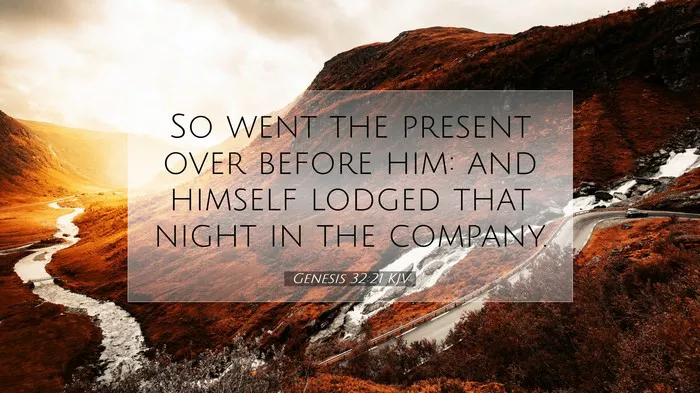Read the Daily Bible Verse – Genesis 32:21 To Strengthen Your Spiritual Journey.
The verse in Genesis 32:21 (KJV) reads:
“So went the present over before him: and himself lodged that night in the company.”
This scripture reflects a profound moment in the narrative of Jacob‘s life as he prepares to reconcile with his estranged brother, Esau. Exploring its meaning allows us to see how biblical principles apply to themes of forgiveness, reconciliation, and faith.
The Context on Genesis 32:21 KJV
Genesis 32 recounts a pivotal chapter in Jacob’s life. After years of separation and a tumultuous relationship with his brother Esau, whom he had deceived out of his birthright and blessing, Jacob prepares to meet Esau. Jacob is aware of Esau’s anger and the likelihood of retribution. In an act of humility and peacekeeping, he sends a large gift ahead to soften Esau’s heart, reflecting his hope for reconciliation.
Jacob’s plan includes sending groups of livestock as gifts, each delivered in succession, demonstrating his understanding of both human fear and divine reliance. The night before their encounter, Jacob finds himself in a place of wrestling — both physically with an angel and emotionally within himself.
The Genesis 32:21 Meaning
The phrase, “So went the present over before him,” signifies Jacob’s proactive attempt to calm Esau’s potential anger. Jacob’s actions reveal his attempt to rely on both spiritual and practical wisdom to navigate the anticipated confrontation. By sending gifts ahead, he creates space for a softened approach and shows a willingness to sacrifice his possessions to restore peace.
Genesis 32:21 therefore can be seen as a testament to Jacob’s growth in faith. He understands that while God’s favor is necessary, his actions must reflect his intentions. The act of sending the gifts serves as a physical symbol of his change in heart and a step toward repentance.
The line, “and himself lodged that night in the company,” speaks to the uncertainty Jacob still faces. Jacob remains in the camp alone, possibly in contemplation, prayer, and preparation for the encounter.
Genesis 32:21 Application in Life
This passage invites believers to reflect on the principles of humility, peace-seeking, and reconciliation. The scripture teaches that while God is sovereign, He often calls us to take tangible steps toward resolving conflicts. It emphasizes that faith is not passive but involves a proactive approach in resolving personal conflicts, an essential practice in Christian life.
Jacob’s act of sending the gifts highlights several principles:
Humility: Recognizing when we’ve wronged someone is the first step toward reconciliation. Jacob could have returned with pride or defensiveness, but he instead approached with humility and generosity.
Faith and Action Working Together: Faith does not mean ignoring actions; rather, it is faith that motivates us to pursue peace, even when outcomes are uncertain.
Preparation for God’s Will: Jacob’s efforts, though extensive, were ultimately in submission to God’s plan. We are reminded that preparation and prayer are companions, where actions we take are done with a heart ready to surrender to God’s wisdom.
By applying these insights, we can approach our conflicts with a similar spirit, hoping that, through God’s grace, relationships may be restored.
Comparison with Other Biblical Texts
To gain a fuller understanding of Genesis 32:21, comparing it with other verses in the Bible that address reconciliation and peace can offer valuable insight:
Matthew 5:23-24 – Jesus emphasizes the importance of making peace with others before offering gifts at the altar, suggesting that relationships with others impact our relationship with God.
Romans 12:18 – Paul encourages believers to “live peaceably with all men,” if it is within their power. This reinforces the message that we are to actively pursue peace, taking necessary steps to facilitate it.
Proverbs 21:14 – “A gift in secret pacifies anger…” speaks to the wisdom of offering gifts as a means of easing tensions, which mirrors Jacob’s actions toward Esau.
These comparisons help to show that Jacob’s approach aligns with other biblical teachings that advocate reconciliation and taking proactive steps toward peace.
Modern-Day Relevance
In today’s context, Genesis 32:21 offers practical guidance in how we handle relational conflicts. In a world where divisions and misunderstandings can often escalate quickly, the principles Jacob demonstrates are remarkably relevant:
Actively Seeking Reconciliation: Whether in personal or professional relationships, taking the first step toward reconciliation can bridge divides. Like Jacob, sending “gifts” or acts of kindness ahead to pave the way for peace is both an act of faith and a tool for peacemaking.
Balancing Faith and Practicality: Jacob’s story reminds believers that, while prayer is foundational, God may also call us to take active steps in creating resolution.
Demonstrating Growth: When we seek reconciliation, our efforts reveal a willingness to grow and to let go of past offenses. This is key in transforming relationships and lives.
This passage can encourage readers today to consider ways to reconcile with estranged friends, family, or colleagues, emulating Jacob’s approach and relying on both faith and action.
Conclusion
Genesis 32:21 is a rich verse capturing the themes of humility, faith, and reconciliation. Jacob’s actions reveal a powerful model for believers today, reminding us that reconciliation often requires humility, proactive steps, and faith. This verse encourages us to step out in faith, trusting that God is ultimately in control of our relationships and their outcomes.
Genesis 32:21 Commentary
In commentary, Genesis 32:21 demonstrates a bridge between past offenses and present repentance. Jacob’s narrative is an example of transformation, where actions and intentions reveal a heart willing to make amends.
Related topics:


